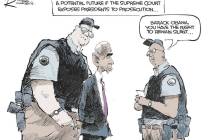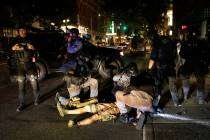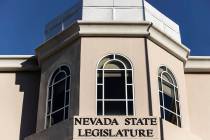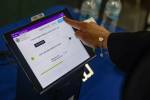Nevada recall campaigns face hurdles
Enraged by political maneuvering that resulted in moderate Republican John Hambrick being elected speaker-designate of the state Assembly, Nevada conservatives are preparing a recall petition to kick Hambrick out of office.
If this recall came to pass, Nevada would be following other states — in the past 21 years, five states have had legislative leaders face recall elections. But the tea party types should not hold their collective breath — because of the quirks of Nevada law, a recall is much harder to get on the ballot in the Silver State than in many other places in the United States.
Using recall elections to target legislative leaders has been a popular, bipartisan undertaking in recent years. It started in 1994, when California Senate President Pro Tempore David Roberti, a Democrat who was already term-limited, faced a recall over his support for gun control legislation. Roberti easily survived the recall, although he lost the Democratic primary for state treasurer. California also got to see a recall used the next year against Doris Allen, a Republican and an independent, who was briefly made speaker after she switched her vote to support the Democrats retaining control of the Assembly. Allen stepped down from the speakership before the recall, and then was trounced in the ensuing election.
In the past few years, we’ve had a nice bounty, though. Michigan House Speaker Andy Dillon, a Democrat, survived a recall vote by anti-tax groups in 2008. Arizona Senate President Russell Pearce, a Republican, was kicked out of office, primarily for his very conservative views on immigration. Wisconsin Senate Majority Leader Scott Fitzgerald, a Republican, was caught up in the recall fervor against Gov. Scott Walker over his anti-union legislation. Fitzgerald easily survived the 2012 vote. Last year, Colorado joined the party, as Senate Majority Leader John Morse was removed over his support for gun control laws.
These facts should be comforting to the recall proponents. Its shows that voters elsewhere are willing to hit that reset button and kick out an elected official, even at the risk of costing their district the benefits that may come from having their local senator or assemblyman serve as legislative leader.
But Nevada is a bit different from other states. And that should be a cause of concern for petitioners.
On its face, Nevada’s recall law seems to be easier than Colorado’s and Wisconsin’s. All three states require petitioners to gather signatures equal to 25 percent of turnout. However, in Colorado and Wisconsin, petitioners have only 60 days to gather those signatures. In Nevada, they have 90 days.
But Nevada’s 25 percent threshold is very different from the benchmark in the other two states. Because of a 1970 constitutional amendment and a 2010 Nevada Supreme Court decision, recall petitioners must collect signatures from people who actually voted in the previous election. Presumably, no new voters can sign — although, as Ballot Access News noted, perhaps someone who moved out of the district or even out of the state can sign.
But that is only part of the problem. Nevada also has a different way of calculating the number of signatures required for a recall. It is not 25 percent of turnout for the specific race. Rather, it is 25 percent of the total ballots cast in the district. There are always a number of voters who skip the down-ticket races, so this number is higher than it would be in other states.
According to the Review-Journal, 16,462 people voted in Hambrick’s district in 2014, so the total seems to be 4,116 valid signatures. This in and of itself should not be a particularly scary figure — it is probably less than any of those previously mentioned recalls. However, the “valid” part is actually very important. In many races, petitioners need to gather 15 to 50 percent more signatures than are required, because many will be thrown out in the validation process.
Nevada’s track record with recalls is another reason to delay the printing of ballots. Over the past four years, of the more than 500 recalls that have made it to a ballot or resulted in resignations, I’ve only seen one occur in Nevada: Las Vegas City Councilman Steve Ross easily survived the vote. The state has had recalls in the past — notably, some in the 1970s — but recalls have not been a regular occurrence. Last year, there was some noise from gun-rights supporters about a recall against state Sen. Justin Jones, a Democrat, over his support for background check legislation. That recall attempt went nowhere.
Nevada conservatives have some reason to be heartened by the growing use of the recall against legislative leaders. But the peculiarities of Nevada law mean that they will face significant challenges in getting this recall to the ballot.
Joshua Spivak is a senior fellow at the Hugh L. Carey Institute for Government Reform at Wagner College in N.Y. He blogs at http://recallelections.blogspot.com/























